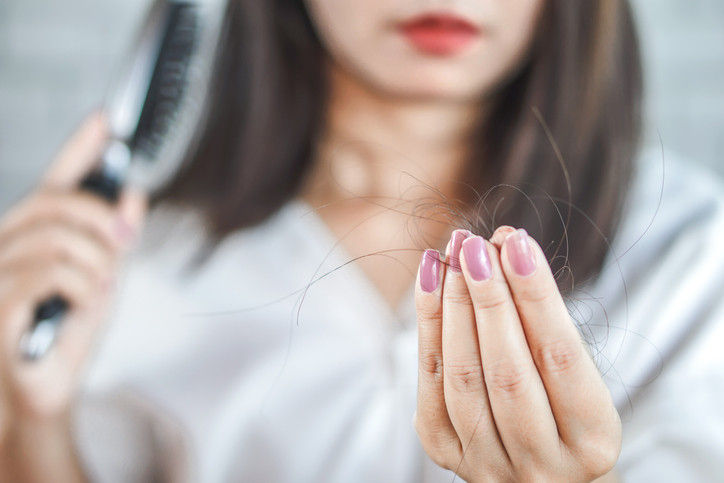The most common causes of hair loss.
- Hair Again Clinic
- Nov 9, 2023
- 6 min read
1. Androgenetic alopecia
Genetics can be one of the leading causes of hair loss worldwide, where certain genes predispose you to hair loss. If someone in your family has experienced hair loss, this increases your chances of developing a hereditary hair loss condition.
In men, the most common condition is androgenetic hair loss, also known as male pattern baldness. Early signs of this type of hair loss include thinning and fine hair, a receding hairline, and excessive hair loss.

In women, the condition is known as female pattern hair loss. Although not as severe as the male counterpart, this condition can still dramatically affect women, who will see an overall thinning of the hair, concentrating on the top and crown of the scalp.
While there is no cure for male pattern baldness, there are treatments available that can slow and stop its progression.
2. Hormonal Fluctuations
Hormones are incredibly important chemicals our body produces and uses to perform various functions. But as we grow older, certain life stages we reach can lead to hormonal imbalances.
These imbalances, especially when hormones like DHT are concerned, can lead to shrunken hair follicles, hair thinning, and premature hair loss.
So what triggers these types of hair loss?
For women, giving birth, and taking birth control pills, as well as menopause, can alter hormones in the system. This often leads to developing conditions such as frontal fibrosing alopecia.
For men, these changes can be triggered with age.
3. Thyroid Issues
Your thyroid is one of the most important glands in the body, responsible for producing hormones that regulate your heart rate and body temperature. If you suffer from thyroid disorders, this can result in hair loss.
Hyperthyroidism is when your thyroid over-produces hormones, while hypothyroidism is when there’s too little. Both can trigger hair loss conditions and can be treated with medications. Once you regulate your hormone production again, your hair will begin to regrow.
4. Medications
Certain medications may list hair loss as a side effect of treatment. This kind of hair loss is often temporary, and once your course of treatment ends, your hair will gradually grow back.
Medications that often have this side effect include:
Antidepressants
Some oral contraceptives
Thyroid-related medications
Anticoagulants (blood thinners)
Anticonvulsants (seizure medication)
Beta-blockers
That said, every patient experiences medication differently, and you are not guaranteed to lose hair in the same manner as someone else. If worried, consult with your doctor, as they may have an alternative recommendation that can help alleviate symptoms. Never stop taking the medication without their advice.
5. High Stress Levels
Stress is something we all experience at some point in our lives. But if you experience it for prolonged periods, stress can affect the quality and quantity of your hair. It’s a vicious cycle – high stress levels can trigger hair loss, intensifying our original stress levels. But there are ways of breaking this cycle.

The following methods are a common way for many people to reduce stress levels and improve their lifestyle:
Exercising each day, e.g., going for a short walk
Practice mindfulness, including meditation and yoga
Improve your diet by eating more vegetables and fruits
You should also try to avoid stressful situations whenever possible.
If you cannot manage and reduce your stress and feel it is impacting your health and your hair, consult your doctor.
6. Lupus
Lupus is an autoimmune condition that can cause joint pain, rashes, fatigue, and hair loss. Your immune system mistakenly attacks healthy tissue in your body, including hair follicles.
As such, lupus may trigger patchy hair loss and skin lesions to develop across your scalp. Certain medications used to treat the condition can also contribute to hair problems.
7. Nutrition Deficiencies
Like any other body part, your hair requires a certain level of nutrition to grow to its potential. If it lacks specific vitamins or minerals, then it will grow short and thin and may fall out earlier than expected.
Examine your diet and try to improve the quality of the food you are taking. Vitamins and nutrients to pay particular attention to include Vitamins A, B-12 (Cobalamin),B7 (Biotin) C, and D. You should also focus on healthy fats, copper, iron, zinc, and selenium.
If you are following a diet, consult with your doctor on possible deficiencies you might be experiencing. They may recommend specific foods and include vitamin and mineral supplements to improve your nutrition.
8. Telogen Effluvium
Your hair follows a strict hair growth cycle. Any disruption to it can cause significant complications, including sudden hair loss.
Telogen Effluvium is defined as excessive hair shedding caused when unusually large amounts of hair in the third phase of the growth cycle. High-stress levels, certain medications, and thyroid issues can trigger the condition.
You may also experience telogen effluvium following major life events, like childbirth, surgery, or dramatic weight loss. Though excessive shedding can feel alarming, hair will begin to grow back once the triggering event has been overcome.
9. Anagen Effluvium
Anagen effluvium is a condition where sudden hair loss occurs because the anagen (or growth) phase is affected.
Hair does not grow as long as it should and sheds earlier than expected. Possible causes include chemotherapy, exposure to harsh chemicals and radiation, fungal infections, and autoimmune diseases.
Depending on its cause, treatment varies between patients, though most often, medication is prescribed to help stimulate and extend hair growth. If undergoing chemotherapy, devices such as cooling caps can help reduce hair loss.

.png)



Comments